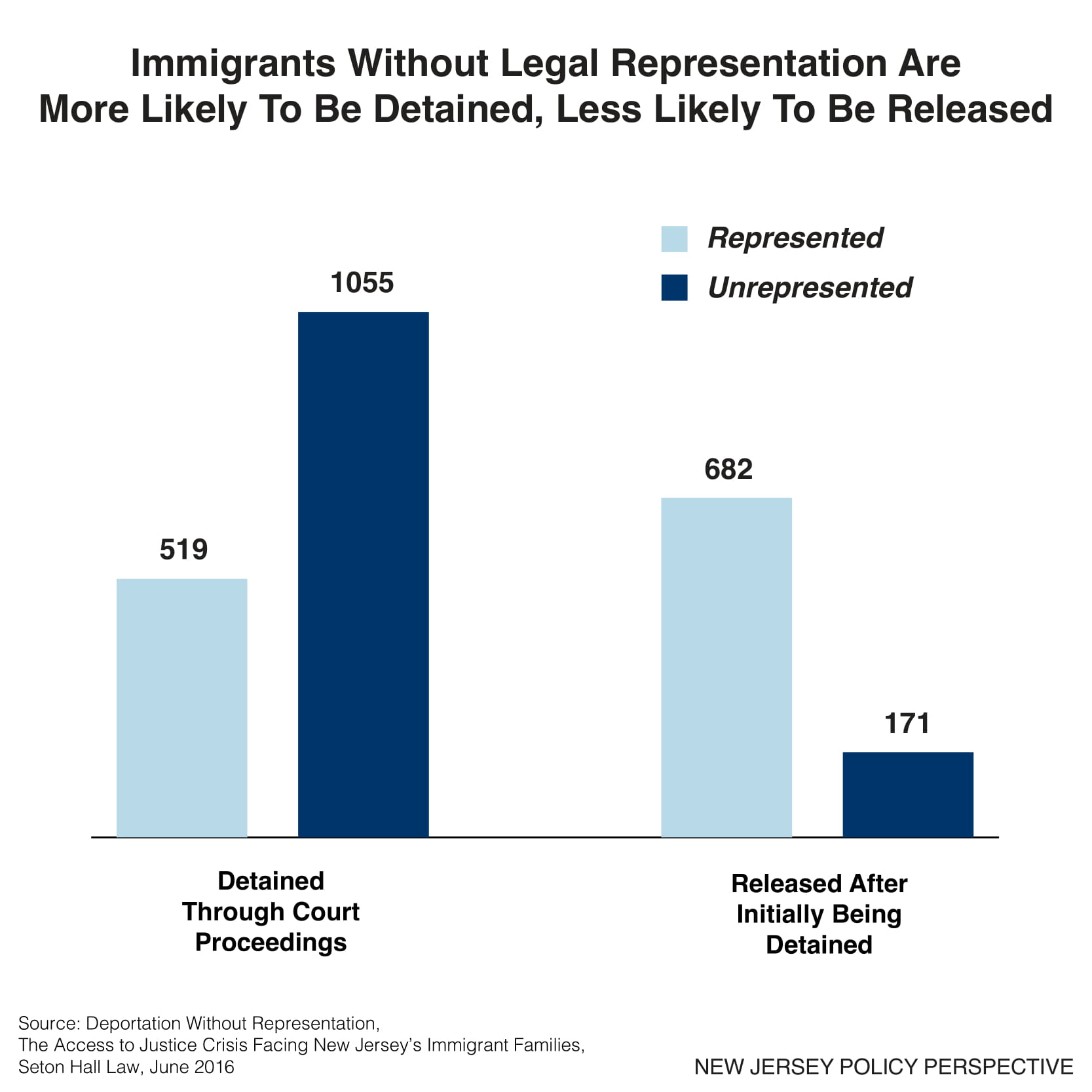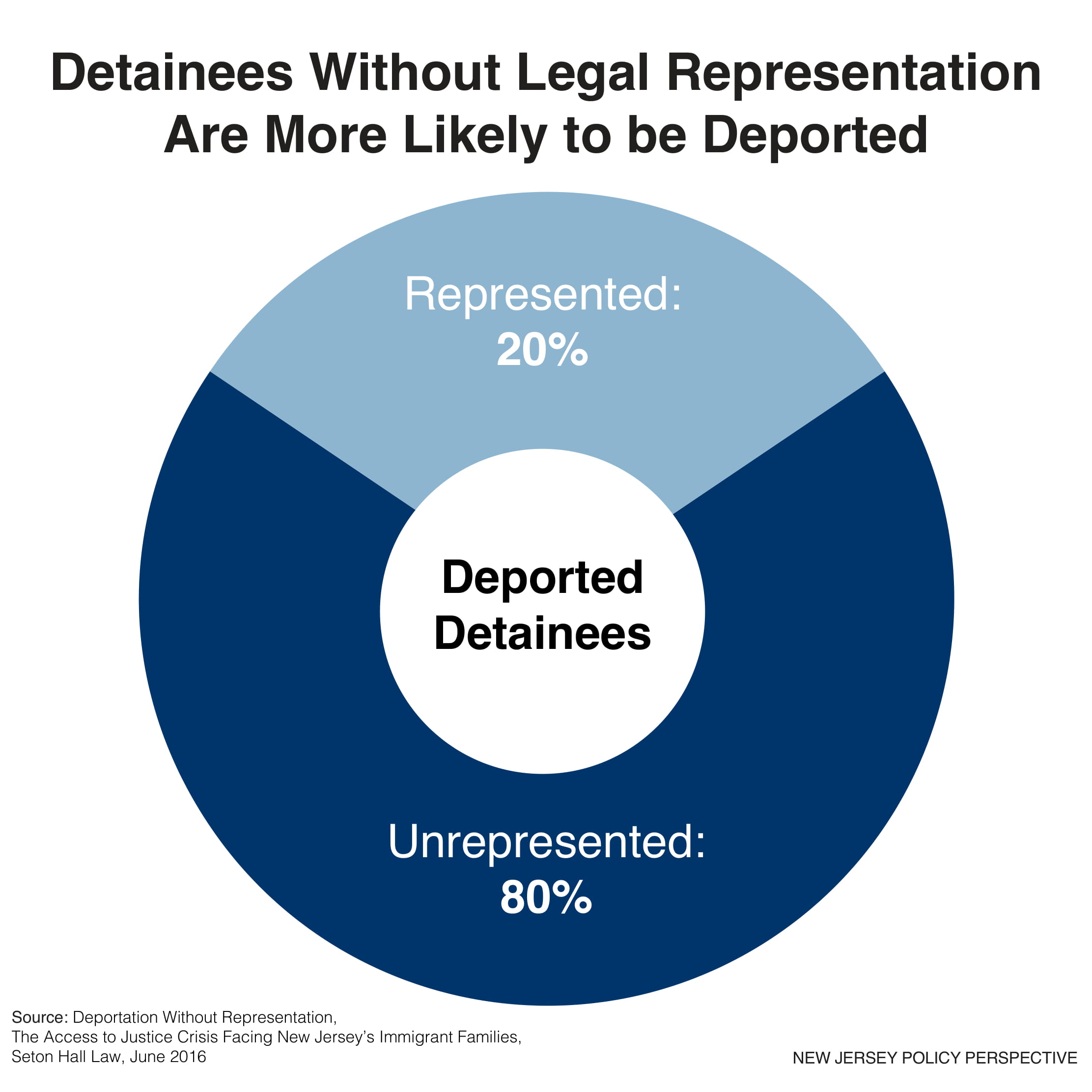To read a PDF version of this report, click here.
New Jersey should create a universal representation program that is publicly-funded to provide free, court-appointed counsel to low-income immigrants in New Jersey who are detained and facing deportation in immigration courts.
Studies have shown that offering legal representation in immigration court increases the likelihood of an individual winning their case, being released to their families, and consequently improving the lives of families.[1] In addition, legal representation has positive impacts in the communities where immigrants reside as deportations not only hurt the individuals, but also their families and local economies. Creating a universal representation program that expands access to counsel for detained immigrants will not only bolster New Jersey’s immigrant families, but the broader state economy.
Key Findings
- In New Jersey, individuals detained for civil immigration violations are three times as likely to prevail in their cases when they have legal representation.[2] With legal representation, they are also twice as likely to be released prior to the end of their removal proceedings.[3]
- New Jersey employers pay $5.9 million in turnover-related costs annually as they are forced to replace detained or deported employees.[4]
- New Jersey’s economy would lose $18 million in wages and$1.6 million in total tax revenue annually from detained immigrants.[5]
- Annually, detentions and deportations cost New Jersey approximately $732,000 in child health insurance and $203,000 in foster care for children of detained or deported parents.[6] This total annual cost of nearly $1 million does not include the long-term costs associated with child trauma, development, and health conditions from deporting their parents.
Legal Representation Keeps New Jersey Families Together
In New Jersey, immigration arrests have increased by 42 percentunder the Trump Administration, far outpacing the national average.[7] As ICE increases arrests at an alarming rate, thousands of people across New Jersey, including U.S. citizens, immigrants with legal permanent residence, visa holders, and undocumented immigrants have been detained and separated from their families and communities, and detached from local economies that depend on them to prosper.
When immigrants in New Jersey are detained and do not have access to legal representation, they are deported 86% of the time.[8] For many of these individuals, they will never be able to return to the United States and reunite with their families.
The journey through immigration court can be lengthy and complicated. In New Jersey, the average detainee spends 62 days in a detention facility.[9] Some immigrants spend their entire removal proceedings jailed in detention centers waiting for their case to be heard and decided by an immigration judge. Others are detained and later released on bond to await trial. Federal government mandates nearly 40,000 immigration beds to be filled by detainees at any given time.[10]
Immigration courts are not required to provide immigrants legal counsel like in the criminal justice system, as deportation is a civil rather than criminal matter. Whether immigrants have access to legal counsel or not, the government proceeds with the immigration case and immigrants are left to fend for themselves in court against a trained government attorney who seeks their removal.
In New Jersey, about 67 percent of people in immigration detention do not have access to legal counsel and must fight their deportation case without a lawyer by their side. Also, detained immigrants in the Garden State are particularly vulnerable: only 14% of immigrants detained throughout their proceedings are able to avoid deportation without legal representation.[11]
Moreover, immigrants and their families are facing greater threats from the federal government than they have in decades. The current administration has made it clear that immigrants without a criminal record are priority for deportation, including parents of U.S. citizen children. Over the past three years, federal immigration authorities have also wrongly detained more than one thousand U.S. citizens.
The Trump administration has also increased the number of immigrants vulnerable to deportation by ending the Temporary Protected Status (TPS) program for 6 of the 10 designated countries. In New Jersey, about 13,900 people from El Salvador, Honduras, and Haiti will lose their work permit and protection from deportation by 2020. Also, the uncertainty of Deferred Action for Childhood Arrivals (DACA) could threaten New Jersey’s 17,000 DACA recipients and 53,000 DACA eligible young peopleinto with imminent deportation.
Lack of Access to Legal Representation is a Drag on New Jersey’s Economy
New Jersey employers bear a large fiscal burden of turnover costs related to detention and deportation. Based on our projections, employers in New Jersey pay an estimated $5.9 millionin turnover-related costs annually as they are forced to replace detained or deported employees. Consequently, employers lose money and production due to a sudden reduction in the workforce.
The financial burden does not stop with employer turnover-related costs, but spills over to the broader state economy. Annually, New Jersey’s workforce loses $18 million in wages and the state foregoes $1.6 million in tax revenue as detained immigrants are unable to show up to work.
Families lose wages, purchasing power and the ability to pay bills on time when a loved one is detained. They are also less able to provide for their children. According to the Center for Migration Studies, deportations increase foreclosure among Latinos by removing income earners from households.
Losing a bread-winner of the household to deportation will likely put many families – including an estimated 168,000 U.S. citizen children of undocumented immigrants in New Jersey – in vulnerable situations and will likely increase their demand for public assistance.[12]
In New Jersey, about 168,000 children have an undocumented parent. Approximately 128,000 of these children, or 78%, are U.S. citizens.[13] In addition, New Jersey has about 8,700 U.S. citizen children with parents who are going to lose their TPS status by 2020 making even more children vulnerable to losing a parent to deportation.[14] Nationally, an estimated 5,000 children are placed in foster care because a parent was detained or deported. Children whose parents are detained or deported are at higher risk of mental health issues and suffer from developmental delays.
Annually, detentions and deportations cost New Jersey approximately $732,000 in child health insurance costs and $203,000 in foster care for children of detained or deported parents. This annual monetary cost of nearly $1 million does not include the long-term costs associated with child trauma, development, and health conditions from deporting their parents.
New Jersey Loses When Immigrants Lack Legal Representation
New Jersey benefits from its diverse immigrant population, with the third highest share (22%) of immigrants nationally and half a million undocumented immigrants that contribute to the state’s social and economic fabric.
The Garden State has 34,232 main street businesses, and immigrants own 48.1% of them.[15] This is the highest percentage share of immigrant owned main street businesses aside from California. In all, almost 270,500 workers in New Jersey are employed at an immigrant-owned business. And immigrants or their children have founded 39% of the nineteen Fortune 500 companies based in New Jersey. These companies generate more than $133 billion in annual revenue and employ almost 600,000 people globally.[16]
But New Jersey’s immigrants aren’t just contributing as entrepreneurs and job creators. They are also paying taxes: more than $13.1 billion in federal taxes and $6.5 billion in state and local taxes each year. And every year, New Jersey’s immigrants are also contributing to our entitlement programs: $2 billion to Medicare (of which $179.4 million is paid by undocumented New Jerseyans) and more than $7 billion to Social Security (of which $695 million is paid by undocumented residents).[17]
If all of the Garden State’s undocumented immigrants were deported, the loss to New Jersey’s Gross Domestic Product, 4.9%, is the largest loss of any of the 50 states, topping immigrant-heavy states like California (4.7% loss), Texas (3% loss) and New York (3% loss), according to a 50-state analysis by the Center for American Progress. [18]
The forced removal of these striving immigrants would cause New Jersey to lose $25.9 billion in annual economic activity. While this is not the largest dollar loss of any state (California tops the list at $103 billion), it is the largest when taken in context of the size of a state’s economy.[19]
New Jersey’s workforce has the third-highest share of undocumented workers in the nation at 7.4%, behind California (10.2%) and Texas (8.7%). But the loss of these workers’ contributions would be more keenly felt by New Jersey’s economy, in large part because New Jersey’s undocumented workers’ contributions to the economy are more diverse and felt in many higher-paid industries.[20]
While families are ripped apart from each other at the border, New Jersey should send a clear message to the nation that it will do its part in keeping families together and ensure that all its residents receive due process including a fair day in immigration court.
Let’s remember that immigrants do not live separately from the rest of New Jersey residents. They are vitally entwined throughout New Jersey’s communities, assets to our state, and contributors to our culture, our economy and our prosperity. If universal representation becomes a reality in New Jersey, our state would join New York and six cities across the country in providing universal legal representation for low-income, detained immigrants. Having a universal representation program is a pro-family, pro-economy policy that lawmakers should support in order to continue New Jersey’s history as the golden door for immigrants. Universal representation would also maintain New Jersey’s status as a welcoming, inclusive state.
Acknowledgments:
NJPP appreciates the feedback received from the following organizations: Make the Road NJ, ACLU, American Friends Service Committee, Fiscal Institute Policy, and the Center for Popular Democracy.
Endnotes
[1] The Center for Popular Democracy. New York Immigrant Family Unity Project – The Report, October 2013. Access to Justice: Ensuring Counsel for Immigrants Facing Deportation in the D.C. Metropolitan Area, April 2017. Vera Institute.Evaluation of the New York Immigrant Family Unity Project: Assessing the Impact of Legal Representation on Family and Community Unity, November 2017.
[2] Seton Hall Law School. Deportation Without Representation the Access-to-Justice Crisis Facing New Jersey’s Immigrant Families, June 2016.
[3] NJPP analysis of the data in the report: Deportation Without Representation the Access-to-Justice Crisis Facing New Jersey’s Immigrant Families. The EOIR data set consists of 3,868 cases and includes all removal cases in which an Immigration Judge (IJ) made a final case-related decision in the New Jersey Immigration Courts (Elizabeth and Newark) between February 1, 2014 and January 31, 2015.54 This data set includes only cases resolved in New Jersey and not cases that were transferred to other jurisdictions.
[4] Used data from Seton Hall Report and duplicated methodology used in The Center for Popular Democracy report, Access to Justice: Ensuring Counsel for Immigrants Facing Deportation in the D.C. Metropolitan Area. Consists of multiplying those detained by those below and above the federal poverty level, multiplying those by adult immigrants in the workforce. Then multiplying the annual salary of those in the combined food serve and preparation workers by 16%, which is the typical turnover costs for positions earning less than $ 30,000 annually. Also, multiplying the annual pay for “other services” by 19.7% the typical turnover costs for positions earning less than $50,000 annually.
[5] To calculate the average wage lost per day we used partof Colorado Fiscal Institute’s calculations in their reportThe High Cost of Immigration Enforcement in Colorado, we multiplied the work days missed by the individuals wage divided by works days missed. The work days missed was calculated using the average days detained in NJ (62 days) and the assumption that a person works 5 days a week. Out of the 62 days is 8 weeks and 6 days. Thus, we subtracted 62-17 to obtain the number of worked days missed. The median individual wage for a noncitizen working full time is $31,200 according ACS (2016 1-year sample). We multiplied the number of works days missed by the average daily salary times the number of detained in immigrants in FY 2017 We multiplied the amount of wages lost by 9 percent – that’s the percent of income paid in taxes by everyone up to the 80th percentile in NJ, according to Institute on Taxation and Economic Policy Who Pays, 5t edition.
[6] Multiply estimated number of U.S. citizen Children of immigrants detained through their proceeding but deported by 57 percent of US-born and naturalized citizen children covered by employer or private coverage. Multiply that product by the annual average per-child cost to Children Health Insurance Program.
[7] The Star Ledger. ICE arrests surging in N.J. under Trump. Here’s why,February 2018.
[8] Ibid 2.
[9] Transactional Records Access Clearinghouse. Legal Noncitizens Receive Longest ICE Detention, June 2013.
[10] National Immigration Forum. The Math of Immigration Detention, 2018 Update: Costs Continue to Multiply, 2018.
[11] Ibid 2.
[12] Migration Policy Institute. A Profile of U.S. Children with Unauthorized Immigrant Parents, January 2016.
[13] Ibid 12.
[14] Center for American Progress. Temporary Protected Status: State-by-state Factsheets on TPS May 2018.
[15] Analysis of the Fiscal Policy Institute unreleased data on immigrant business owners. 2016.
[16] New Jersey Policy Perspective. New Jersey’s Immigrants are a Huge Economic Driver, February 2017.
[17] Ibid 16.
[18] Ibid 16
[19] Ibid 16.
[20] Ibid 16.



